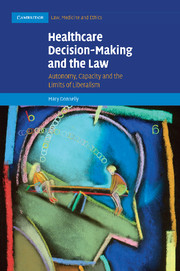Book contents
- Frontmatter
- Contents
- Acknowledgements
- List of cases
- List of legislation
- Introduction
- 1 Autonomy: variations on a principle
- 2 Autonomy in the law
- 3 Capacity: the gatekeeper for autonomy
- 4 Capacity assessment in practice
- 5 Autonomy, rights and decision-making for patients lacking capacity
- 6 Treatment for a mental disorder: a case apart?
- Conclusion
- Bibliography
- Index
- References
Conclusion
Published online by Cambridge University Press: 04 February 2011
- Frontmatter
- Contents
- Acknowledgements
- List of cases
- List of legislation
- Introduction
- 1 Autonomy: variations on a principle
- 2 Autonomy in the law
- 3 Capacity: the gatekeeper for autonomy
- 4 Capacity assessment in practice
- 5 Autonomy, rights and decision-making for patients lacking capacity
- 6 Treatment for a mental disorder: a case apart?
- Conclusion
- Bibliography
- Index
- References
Summary
This book has explored the difficult legal and normative questions to which healthcare decision-making gives rise. It has shown that, while the legal status of the autonomy principle appears to be well established and stable, in reality the position is doctrinally less clear and normatively more problematic than classic legal dicta might suggest. This concluding chapter revisits the arguments made in earlier chapters and identifies some of the implications of these arguments for the future development of the law in respect of healthcare decision-making. In doing this, it identifies some of the major themes which have emerged from the discussion throughout the book. Five such themes are explored. These are first, the view of autonomy as achievement or empowerment; secondly, the limitations of capacity as a gatekeeper for the right of autonomy; thirdly, the appropriate role for law in healthcare decision-making; fourthly, the possibilities and limitations of a human rights focus in healthcare decision-making; and, finally, the need for closer empirical interrogation of the law in practice.
Autonomy as empowerment
A recurrent theme throughout this book has been the limitations of the conception of autonomy as non-interference. This account of autonomy, which derives from Mill's liberal view of the individual operating within a sphere of freedom protected from state interference, has been highly influential in the development of healthcare law and ethics. However, this view of autonomy is flawed in a number of respects.
- Type
- Chapter
- Information
- Healthcare Decision-Making and the LawAutonomy, Capacity and the Limits of Liberalism, pp. 269 - 280Publisher: Cambridge University PressPrint publication year: 2010

